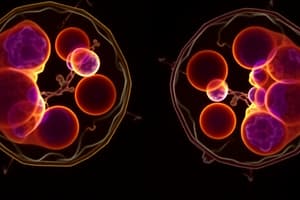Podcast
Questions and Answers
What is the main difference between mitosis and meiosis?
What is the main difference between mitosis and meiosis?
- Mitosis produces genetically identical daughter cells, while meiosis produces genetically diverse daughter cells. (correct)
- Mitosis primarily occurs in sexual reproduction, while meiosis occurs in asexual reproduction.
- Mitosis involves genetic recombination, while meiosis does not.
- Mitosis results in four haploid cells, while meiosis results in two diploid cells.
What is the primary purpose of meiosis in cellular processes?
What is the primary purpose of meiosis in cellular processes?
- To increase chromosome number for cell differentiation
- To produce genetically identical daughter cells
- To create genetically identical offspring
- To reduce the number of chromosomes by half to form gametes (correct)
Which phase of the cell cycle involves the division of the cytoplasm resulting in two distinct daughter cells?
Which phase of the cell cycle involves the division of the cytoplasm resulting in two distinct daughter cells?
- Prophase
- Metaphase
- Cytokinesis (correct)
- Anaphase
During which stage of mitosis do the chromosomes separate into two sets?
During which stage of mitosis do the chromosomes separate into two sets?
What is the end result of meiosis?
What is the end result of meiosis?
What is the key difference between mitosis and cytokinesis?
What is the key difference between mitosis and cytokinesis?
Flashcards are hidden until you start studying
Study Notes
Biology: Exploring Cell Cycles and Human Reproduction
Cell biology delves into the fundamental processes of cell growth, division, and reproduction. These processes play essential roles in the development and maintenance of lifeforms on Earth. Two key cellular procedures contributing to these phenomena are mitosis and meiosis. While mitosis focuses on the growth and maintenance of cells by producing two genetically identical daughter cells, meiosis deals with the reduction of chromosomes to produce four genetically diverse daughter cells for the purpose of sexual reproduction.
Mitosis and Cytokinesis
Mitosis is a nuclear division process that, when completed, results in two identical somatic cells with the same genetic complement as the original cell. This cell cycle phase involves a series of stages: prophase, metaphase, anaphase, and telophase. During mitosis, the nucleus divides, and the chromosomes separate into two sets. Afterward, cytokinesis occurs, which is the division of the cytoplasm and ultimately leads to the formation of two distinct, genetically identical daughter cells.
Meiosis
Meiosis, on the other hand, is a specialized form of cell division that aims to reduce the number of chromosomes by half before producing gametes (sexual reproductive cells) such as sperm or eggs. The ultimate goal of meiosis is to generate haploid cells, each containing one chromatid from each homologous pair, totaling two chromosomes per cell.
Phases of Meiosis
Meiosis consists of two main phases: meiosis I and meiosis II. These processes involve the separation of sister chromatids within homologous pairs during meiosis I, followed by further separation of paired chromosomes through meiosis II.
Applications of Cell Biology
Understanding cell biology, including mitosis and meiosis, has led to several significant advancements in the field of reproductive technologies. For instance, techniques like human in vitro fertilization and animal cloning rely heavily on understanding these processes. Additionally, studies on cell cycles and reproduction have fostered progress in fields such as proteinomics, genomics, and epigenetics.
Studying That Suits You
Use AI to generate personalized quizzes and flashcards to suit your learning preferences.




